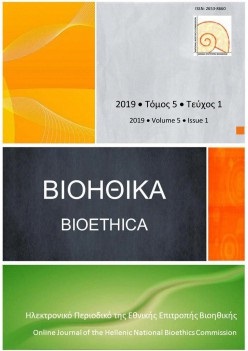General Data Protection Regulation and Horizon 2020 Ethics Review Process: Ethics Compliance under GDPR
Abstract
The present manuscript examines the new ethics data protection requirements introduced for the research projects funded by the European Programme Horizon 2020.
Initially, reference is made to the basic data protection principles introduced by the General Data Protection Regulation (GDPR) and the derogations permitted in the research field in favor of the science advancement. Although these derogations are subject to a number of safeguards to protect personal data, new ethics requirements are introduced for research projects funded by the European Programme Horizon 2020. The aim of these safeguards is the increased transparency and accountability at the data processing and the consequent enhanced protection of the individuals’ rights. These requirements are geared to the main research ethics postulate, which requires free, voluntary and informed participation of the research subject.
Under these new requirements, Horizon 2020 beneficiaries/applicants must comply with a set of predefined standards, reflecting their ethical and legal obligations, provide a detailed and precise description of the technical and organisational measures that will be implemented in order to safeguard the rights of the research participants and also demonstrate their observance. In addition, depending on the type of the data being processed and the data processing techniques, the H2020 applicants/beneficiaries may need to provide a number of additional documents/explanations and implement further measures.
Article Details
- Come citare
-
Kuyumdzhieva, A. (2019). General Data Protection Regulation and Horizon 2020 Ethics Review Process: Ethics Compliance under GDPR. Bioethica, 5(1), 6–12. https://doi.org/10.12681/bioeth.20832
- Fascicolo
- V. 5 N. 1 (2019): Bioethica
- Sezione
- Original Articles

TQuesto lavoro è fornito con la licenza Creative Commons Attribuzione 4.0 Internazionale.
Authors who publish with this journal agree to the following terms:
- Authors retain copyright and grant the journal right of first publication with the work simultaneously licensed under a Creative Commons Attribution CC BY 4.0 License, which allows for immediate free access to the work and permits any user to read, download, copy, distribute, print, search, or link to the full texts of articles, crawl them for indexing, pass them as data to software, or use them for any other lawful purpose. Appropriate credit must be given by citing the author(s) and the original publication in this journal.
- Authors are able to enter into separate, additional contractual arrangements for the non-exclusive distribution of the journal's published version of the work (e.g. post it to an institutional repository or publish it in a book), with an acknowledgement of its initial publication in this journal.
We encourage authors to deposit their articles, as well as data underlying the publications, in institutional and/or other appropriate subject repositories.
Bioethica permits and encourages authors to archive the final publication pdf in institutional (e.g. the repository of the National Hellenic Research Foundation) or other appropriate subject repositories (e.g. SSOAR repository for social sciences), in compliance with institutional and/or funder open access policies, after publication in the BIOETHICA. Authors must provide bibliographic details that credit publication in the journal, as well as related funding details (when applicable).
Lists of institutional and other subject-based academic open access repositories can be found listed by country at the registry http://opendoar.org/countrylist.php
If your institution does not possess a repository you may deposit a copy of your paper at no cost with www.zenodo.org , the repository supported for open access research in the EU by the European Commission, through the project OpenAIRE (www.openaire.eu )



